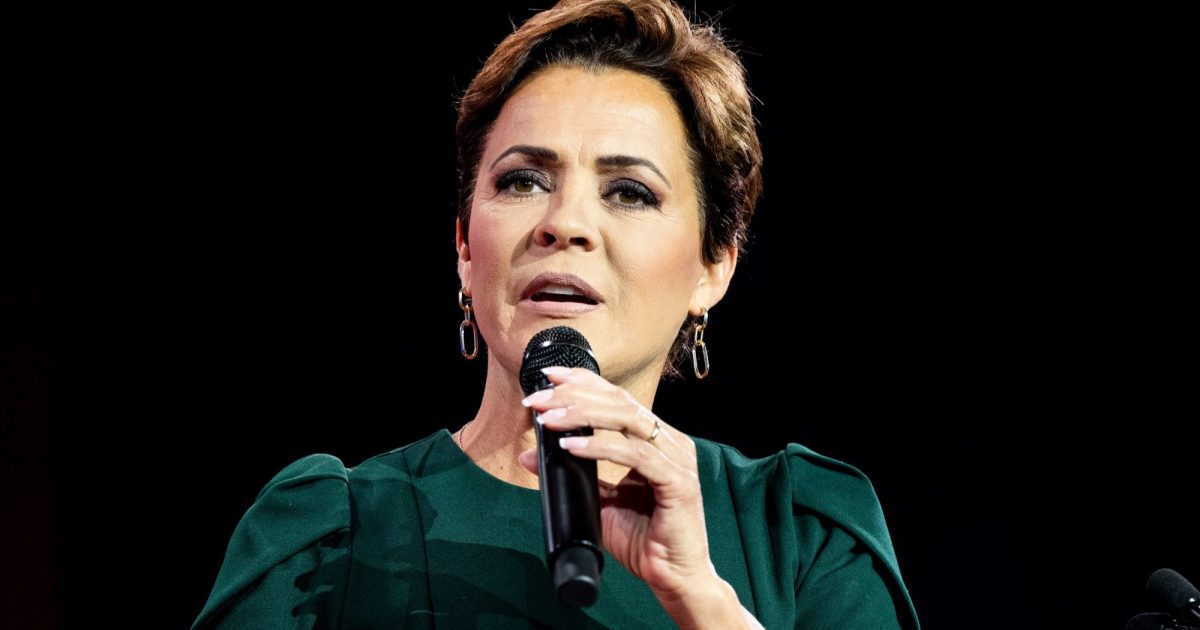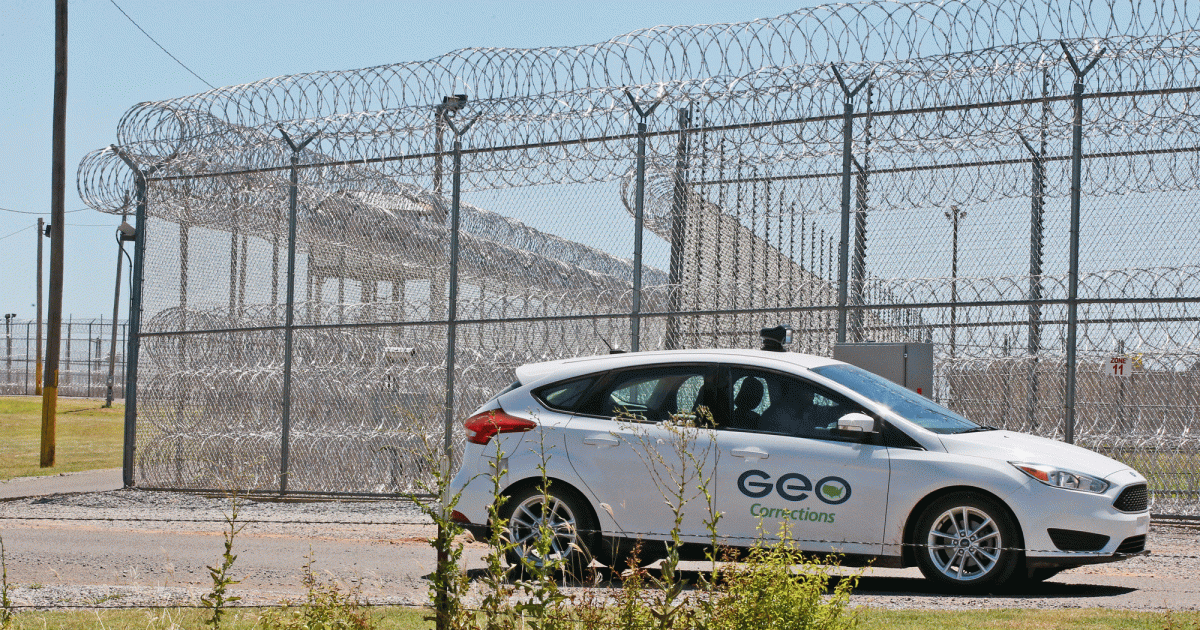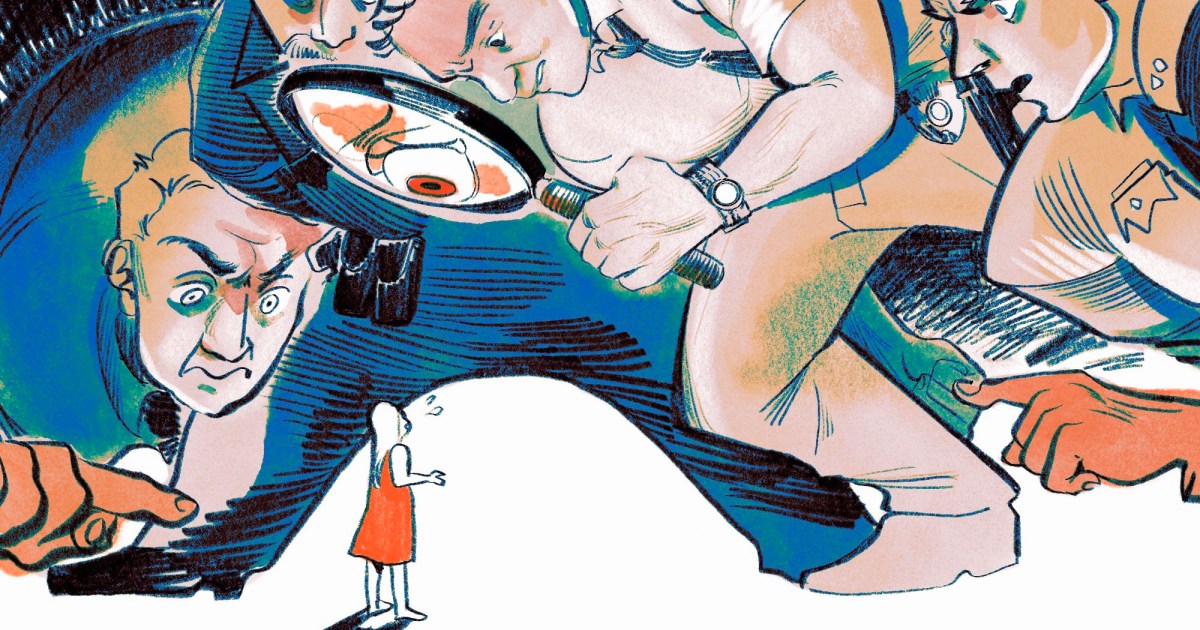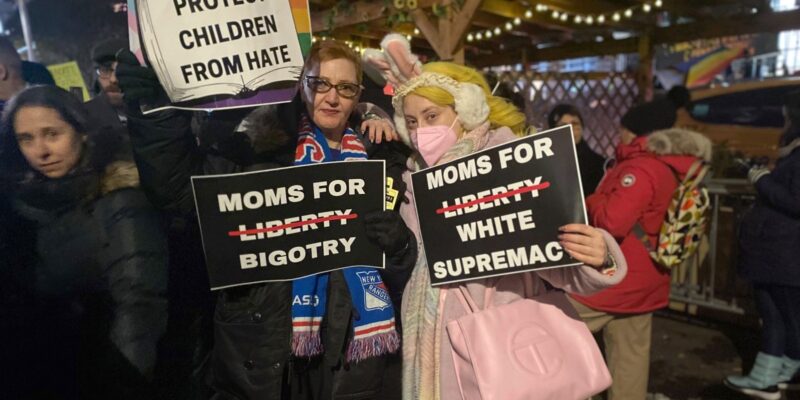
On my way to Moms for Liberty’s New York City town hall last night, I passed a posh-looking elderly woman, decked out in a brown fur coat, matching fur hat, and bright red lipstick.
This was a more typical sight on the Upper East Side—the wealthy enclave that has been home to characters like Carrie Bradshaw, Jared and Ivanka, and much of the cast of Gossip Girl—than the one I encountered at the end of the block. Outside the Bohemian National Hall—a Czech and Slovak cultural center on East 73rd Street that the right-wing group booked to great outrage—protesters wielding signs with slogans like “Moms for Bigotry” and “Protect Children From Hate” shouted down attendees who filed into the building (which included Rudy Giuliani’s son, Andrew, and disgraced former congressman George Santos) via a police-protected ramp. Moms for Liberty, the so-called parents’ rights group that has pushed book bans and helped stir the moral panic about pronoun usage in schools, promised the event would consist of “important discussions about education in NY.”
But the protesters were skeptical that the group had anything of substance to offer at its first formal event in deep-blue New York City.
“They need to go back to Florida—take the bigotry back where it belongs,” said protester and Brooklyn resident Julie DeLaurier, who said her two kids were graduates of the city’s public schools. “If it works in DeSantis land, fine. It doesn’t work here.”
New York City schools, she added, need “full funding—not censorship.” (The city’s education department will face $100 million in new cuts during the next fiscal year, on top of $600 million in cuts Mayor Eric Adams already announced, Chalkbeat New York reported this week.)
Indeed, inside the hall, remarkably little of the two-hour conversation that unfolded focused on specific educational issues—or proposed solutions—relevant to New York City public school students, parents, or teachers. Instead, speakers continuously contradicted themselves. They trotted out their go-to culture war talking points—about “gender ideology” and diversity, equity and inclusion in schools—while also wondering aloud how education had “become so political.” They mocked the protesters outside—and President of the American Federation of Teachers Randi Weingarten—for allegedly failing to engage on educational issues, while also trading ad hominem barbs about them. They adopted the language of anti-racism and LGBTQ inclusion, even as they critiqued it.
The Moms for Liberty are no strangers to these kinds of contradictions. Take, for example, Bridget Ziegler, who, as my colleague Kiera Butler has reported, was instrumental in drafting Florida’s “Don’t Say Gay” legislation, which forbids discussion of LGBTQ issues in public schools. In December, it was revealed that Ziegler herself was involved in a years-long three-way sexual relationship with both another woman and her husband, now-ousted Florida GOP chairman Christian Ziegler, who stands accused of raping the other woman during an encounter where his wife wasn’t present.
That drama is part of the reason the group’s influence has recently been waning, according to reports—and it might explain why its leaders are trying to sharpen their focus on literacy issues and expand their influence in blue states like New York and Philadelphia, where they held their national conference last year, which Kiera attended.
If this all sounds like a wild ride, it was. The drama, though, started long before last night’s event began.
Moms for Liberty was founded by a group of conservative school board moms in early 2021 to protest mask and vaccine mandates in schools. Their fight quickly snowballed into a catch-all campaign for right wing culture warriors concerned about gender-inclusive and anti-racist curricula; soon, they had won the support of conservative powerhouses like Florida Gov. Ron DeSantis and Trump, and attracted hundreds to conferences bankrolled by conservative organizations like the Leadership Institute and Heritage Foundation. Now, they have more than 300 chapters in 48 states—including 15 in New York—with 130,000 members, co-founder Tina Descovich told the room last night.
When the Moms announced the NYC event, backlash was swift.
After a slew of local politicians condemned it, the venue got so many requests to cancel the event that the president of the Bohemian Benevolent and Literary Association, which oversees the hall, issued a lengthy statement last weekend, saying that while they weren’t legally allowed to cancel the event, the President, Joseph Balaz, would personally match the rental fee Moms for Liberty paid, and donate the “double-sum…to one of our organizations which actively supports young, future leaders.”
“Furthermore, as a first-generation immigrant who years ago escaped a dictatorship and absolute censorship, I am personally very sensitive to concepts like book banning, thought, and expression controls, and so on, which this highly politically charged turmoil around this event brings out,” Balaz added in the statement.
The only clear presence Moms for Liberty had in New York City prior to last night appeared to be a local chapter in Queens, founded last year by a former public school guidance counselor named Elena Chin, who spoke on a panel at the town hall about how school closures during COVID made kids fear they’d kill their parents if they contracted the virus once they returned to school. According to an interview Chin gave to the nonprofit news outlet the 74, the Queens chapter has been meeting by Zoom since last spring, and shares some of the same goals of the national chapter—namely, to limit books and educational content discussing sex, racism or LGBTQ issues.
Manhattan Borough President Mark Levine, who was one of the event’s most vocal critics, told me outside the event that he’s “alarmed by the attempt of this extremist group to try and get a foothold in Manhattan.”
“I take the threat seriously—we have had a red wave in New York,” he said, adding he now sees it as a “swing state.”
But, he added, he was “pumped” by the strong turnout of protesters. “What you hear outside is an actual message of liberty—the freedom to read books, the freedom to learn actual history, the freedom of a child to be who they are,” he said. “That is freedom, that is liberty.”
The event started with a prayer—and a bit of shade-throwing.
“Lord, we pray for those in the streets who are yelling at a building,” the speaker said, to laughs in the audience of about 100 people. “Open their eyes to the truth of our mission, that we wish to preserve our parental rights as you have given to us.”
They also asked for blessings for the venue hosts: “While they may not understand exactly who we are, they allowed us to come nonetheless,” the speaker said.
And then the fun began.
One of the group’s co-founders, Tiffany Justice, started by saying that while the group had been accused of trying to “ruin New York City public education,” one of her friends quipped that it couldn’t get much worse. The room laughed. (The city department of education didn’t respond to my request for comment about that dig.) But while a few of the speakers said they wanted schools to do a better job of teaching “reading, writing and arithmetic,” there was little discussion of how, exactly, they’d like to improve things.
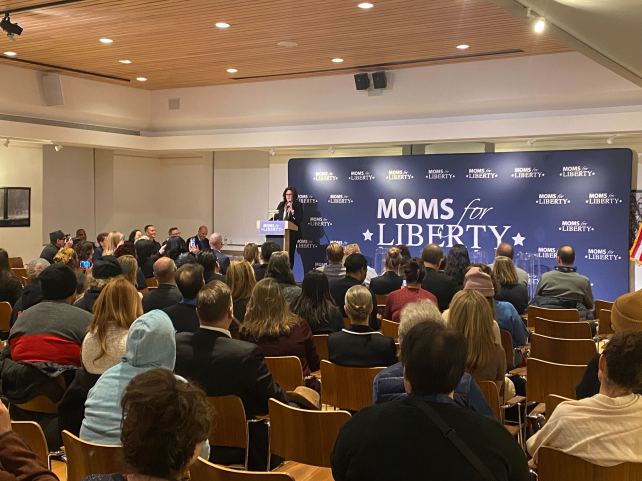
Tiffany Justice, a co-founder of Moms for Liberty, addresses the crowd of about 100 at the NYC town hall Thursday.
Julianne McShane/Mother Jones
Even the speaker who was the first to raise those issues—Wai Wah Chin, president of the Chinese American Citizens Alliance of Greater New York and a local activist whom conservative activist Edward Blum credits with helping to bring the Supreme Court case that ended affirmative action in college admissions—got sidetracked by Moms for Liberty’s classic culture war talking points.
“All of this stupid—excuse me—all of this stuff that they say, ‘oh, we’re going to teach you to be an activist,’ what do you mean by ‘teaching you to be an activist’ before you even know how to think?” she asked. (It’s unclear which New York City public school teachers she was referring to who have allegedly promised to teach students how to be activists—I wrote to her Friday afternoon to ask, but no word back yet.)
“The people outside,” she continued, referring to the protesters, “they don’t know how to do your facts and logic.”
Mocking their opponents—and co-opting the language of anti-racism and LGBTQ inclusion even as they derided it—were key themes of the evening among speakers.
During the second part of the evening, Canadian activist Chris Elston railed against what he called “chemical castration” and called pronouns “abusive.”
Later, Maud Maron, a member of the Manhattan Community Education Council—essentially its school board—dismissed a protester who identified herself as a “proud queer woman” at the school board meeting the night before as “a straight girl without a boyfriend.” When an audience member later criticized her for that comment, she defended it as a “deeply serious” critique of how “kids that, when I was in high school, were gay…those kids are now queer or bisexual or trans or something else, and I think there’s a deep homophobia in that.” (Maron is no stranger to controversy: local parents and teachers called for her and another board member’s removal last month after the 74 published a story showing texts she wrote denying the existence of transgender children and writing “the social contagion is undeniable” in response to a parent’s concern about the number of LGBTQ kids in their child’s school. A DOE spokesperson called Maron’s comments in the 74 story “despicable and not in line with our values.”)
Stoking transphobia is a key tactic of Moms for Liberty, with some of their most ardent activism being around pronoun use and “social transitioning” in schools, which describes beginning the process of presenting—through one’s name, pronouns and/or dress—as the gender with which one identifies. That process, and the practice of some school districts (including New York City’s) letting children decide whether or not they want to let their parents know they’re socially transitioning in school, has come under fire from conservative groups like Moms for Liberty, who argue that parents have a right to know; some right-wing activists—including some speakers last night—falsely argue that schools use such policies to forcibly transition students.
“School counselors do not indoctrinate or willfully transition students,” Jill Cook, executive director of the American School Counselor Association, told Kiera, my colleague, in 2022. “We want nothing more in this world than to help and support students.”
Research shows that socially transitioning is not harmful to trans youth, but that harassment from peers based on their gender identity can be.
New York City school policy mandates staff and students “refer to students by their chosen names and pronouns.” Regarding students’ social transitions, the policy notes that “the student is in charge of their gender transition and the school’s role is to provide support,” and that schools should “balance the goal of supporting the student with the requirement that parents be kept informed about their children,” since some “transgender and gender expansive youth may experience significant family challenges.”
About 45 minutes into the town hall, I took a much-needed break—to chase down Santos.
He hadn’t been shy about attending. Once Santos snagged his seat inside, he posted on X: “We are in the house! All love in the room and I can’t wait to have a fantastic evening strategizing to save our kids from indoctrination and put an end to WOKE!”
But it took me a while to spot him. Finally, I did: directly across the room, cackling in a corner seat when self-described “school choice evangelist” and panelist Corey DeAngelis cracked jokes on stage about Weingarten, the president of the national teachers’ union, who has become a lightning rod for conservative critics as culture wars have infiltrated classrooms.
“She won’t even debate on Twitter—she closes her replies!” DeAngelis quipped. At this, Santos guffawed, clapping with glee.
When he slipped out of the room, I gave chase—along with a Czech television reporter. We caught Santos by the elevators, my Czech counterpart making it there before me. But Santos turned him down: “I don’t speak to foreign media,” he told him.
I took my cue: “I’m from Mother Jones,” I told him.
“Mother Jones!” he exclaimed, possibly recalling the fact that it was the work of my colleagues Noah Lanard and David Corn that exposed his fake donor scheme, leading to his indictment.
Before he could hesitate—or bolt—I seized the seconds we had to question him as he waited for the elevator; he had to dash because he was off to dinner, he said.
What’d he think of the event?
“It was great, I think it’s diversity of thought—and if you disagree with this, then I think you have a problem.”
What’s next—might he be getting involved more in Moms for Liberty going forward?
“No—I’m not a mom!” he said, stepping into the elevator, to the laughs of his posse.
Last but not least: how’s Cameo? (He now charges $350 per personalized video, which last an average of 51 seconds, according to his page on the platform.)
“It’s great, it’s fun,” he said, the elevator doors closing. “You should order one! Bye!”
The night ended with an audience Q&A—and that’s when the speakers were confronted with their critics.
The first question of the night, from a parent named Bryan, summed up the critiques of other parents who also said the evening’s discussion didn’t address the true issues affecting the city’s schools: “Reading, writing, arithmetic: what are your plans for the curriculums? Because I would love to know what you think are wrong with the current curriculums and how we’re going to change them.”
Maron, the CEC member, quickly clapped back, noting that she had mentioned—though it was actually only in passing—the city’s new literacy curriculum, which focuses more on phonics than the previous curriculum, which emphasized what was known as balanced literacy and relied more on encouraging students to use context clues to decode words. The new curriculum was announced by schools Chancellor David Banks last year, in response to the fact that about half of the city’s kids in grades 3 – 8 weren’t reading at grade level, with Black, Latino and low-income kids faring worse; the new approach went into effect in schools this academic year.
Chin chimed in: she, too, had mentioned the phrase “reading, writing, and arithmetic,” she told Bryan. “The problem is, the teachers have to teach that,” she added.
Later, Bryan—who declined to give his last name, because he was worried about further backlash—told me he wasn’t impressed, and didn’t find the discussion relevant. “As someone who’s been in the school system, there’s a lot of problems, but [NYC] parents have tons of say—the PTA is very powerful in most districts,” he said. “So the question is just, what is the agenda here?”
If literacy rates need to improve in the city’s schools, he added, “what are the things that are needed to change that?”
Answering his own question, he said: “It’s not about demonizing the teachers’ unions. It’s going to be about changing the style, giving more teachers the help, more funding.”
Some attendees, though, found the evening useful.
After the event ended, I caught up with Gricel Arriola, whom I had seen filming much of the event on her phone and praising speakers when they made points she agreed with. She has four kids, she said, two of whom she recently pulled out of the public school system to homeschool—after what she called “the plandemic” and the vaccine mandate the city instituted for teachers and students (her kids weren’t vaccinated, she said).
The speakers, she said, echoed many of her concerns—which, for the record, she said, are not about demonizing LGBTQ people.
“It’s not about that,” Arriola said. “We’re freedom fighters.”
“I want my kids to learn critical thinking skills,” she added, rather than experience the “sexualization” and “pedophilia” that they would in the school system.
Had she seen evidence of that, I asked, or had her children experienced it directly in the city’s schools?
No, she told me—she pulled them out of school before it was possible.
It was time to leave, and some people were scared.
“Are the crazies still out there?” a blonde woman asked a cop, referring to the protesters, as she put on her coat and a pastel multi-colored scarf.
“They thinned out,” the cop replied, “but they’re still there.”
I asked the woman why she came to the event—”to learn,” she said—and what she thought of it. But she didn’t want to talk to me; she wanted to go home.
And when she did, she and the others were met with the chants of a few dozen protesters who had braved the bitter cold to bid the attendees farewell with a chant: “Worst moms ever!”
This story has been updated to correct the spelling of Elston’s last name.





